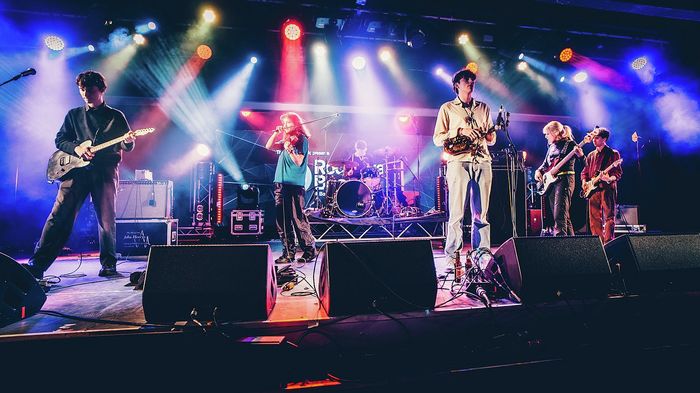Holding the line for rock: Skinty Fia review
Fontaines D.C. returns with their third studio album ★★★½

Skinty Fia, the third studio album from Dublin-based band Fontaines D.C., is a mixed bag. The group’s influences shine brightly across the forty-five minute run-time, pulling from eighties punk, modern post-punk, Irish folk, shoegaze, and even choral music. And yet, while these influences lend the band a handful of ideas which they put to good effect, the album feels noticeably stale in the light of contemporary bands that alter and expound their genre trappings more noticeably.
While the Fontaines D.C. catalogue is markedly consistent, their two previous releases suffered from this same issue. Dogrel was a solid debut. Did it push boundaries? No, but it did not need to, and it succeeded in cementing the band’s future as prospectively bright. A Hero’s Death, their second offering, now forms a lull in the band’s discography, memorable for its rather limited array of instrumentation, a flavourless base stretched thin over an unjustified runtime. The band does, however, play successfully with spoken-word poetry in a way reminiscent of Sleaford Mods or The Fall, and this quality resounds through their discography. The group met in college, and bonded over a shared love of poetry, and this love is clearly realised in their music even if it does not make the band stand out on its own.
“The album feels noticeably stale in the light of contemporary post-punk bands”
The opener, “In ár gCroíthe go deo”, breaks quickly into a brooding, choralesque vocal line written in a minor harmony. Drums kick in with catharsis as we reach up to a higher melody in the line: “She defines the only answer,” soon supplemented with its lower counterpart: “But I never had the time.” In true post-punk tradition, the lyrical base template stays constant throughout, and the instrumentation alone is forced to compensate, growing more and more intense, and perhaps entailing an unresolved state of reflection or obsession with a past mistake.
Then there’s “Big Shot”, a song which asks how we can delineate real from fake, and which features the beautiful lines: “Home is a pin / Rusting through a map / I go there to pray / Do my resting at mass.” There’s a romantic sway in the guitar line, but there’s an edge of unpredictability in it too.
“The album goes out with a whimper, not a bang”
The slower tempo and sleepy vocals of “Bloomsday” push the band towards shoegaze, and yet the intrigue is not quite there. In a more vibrant tracklist, this song might have been able to flourish: as it is, “Bloomsday” melds far too easily in with the tone of the rest of the album, and the interesting genre crossover falls short. “Roman Holiday” is a return to form, only to be followed by perhaps the worst song on the album. “The Couple Across the Way” features a droning accordion that matches exactly with the vocal lines, forming a predictable base that, for four minutes, the band fails to expound upon.
The closer, “Nabokov”, features a return to the undertone of shoegaze, and the brown guitars layered throughout would not feel out of place in the harsher spots on the discography of Nine Inch Nails. The song’s main flaw, as is the case for perhaps a third or more of the tracklist, is that the ending is far longer than it needs to be. The album thus goes out with a whimper, not a bang.
Skinty Fia falls short of being a concept album, but there is a common thematic core throughout. In a recent interview with Rolling Stone, frontman Grian Chatten stated the album was “largely informed and influenced by Irishness existing in England”. The giant Irish deer, featured on the cover, is now an extinct species, and the band’s attempt to re-identify with Ireland, their country of origin, leaves a trail across the album Skinty Fia. Conor Deegan, the band’s bassist, told Mojo that he “dreamed [...] of making three great albums, like Nirvana had. That was my ambition – so now that we’ve done that, I don’t really mind what we do.” While each of their records has been solid, the group has not, to date, released anything as commercially or critically successful as Nirvana’s Nevermind: this, they tell us, is not important, because they have achieved what they set out to do.
Perhaps the band is looking for consistency, not glints of brilliance. Perhaps they do not feel the need to push genre boundaries in the way that post-punk contemporaries such as Squid, Black Midi, IDLES, and Black Country New Road do. They fall more in line with groups like Dry Cleaning, Wet Leg, Shame, and Yard Act: they do not push the boat out, nor do they bring it back in. In an age where the rebelliousness of rock has been eroded by commercialism, and demand for the genre has been shrivelled by newer trends in music coming to the fore, bands like Fontaines D.C. play an important role in holding the line for rock, filling a niche where accessibility and quality can be neatly melded without overflowing, waiting for the day when the genre can be more widely appreciated.
 News / Cambridge academics stand out in King’s 2026 Honours List2 January 2026
News / Cambridge academics stand out in King’s 2026 Honours List2 January 2026 Interviews / You don’t need to peak at Cambridge, says Robin Harding31 December 2025
Interviews / You don’t need to peak at Cambridge, says Robin Harding31 December 2025 News / AstraZeneca sues for £32 million over faulty construction at Cambridge Campus31 December 2025
News / AstraZeneca sues for £32 million over faulty construction at Cambridge Campus31 December 2025 News / News in Brief: Maypole mentions, makeovers, and moving exhibits4 January 2026
News / News in Brief: Maypole mentions, makeovers, and moving exhibits4 January 2026 Features / “It’s a momentary expression of rage”: reforming democracy from Cambridge4 January 2026
Features / “It’s a momentary expression of rage”: reforming democracy from Cambridge4 January 2026










